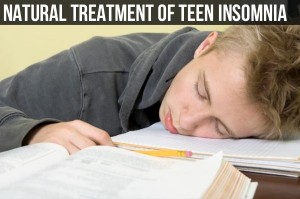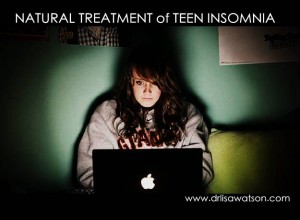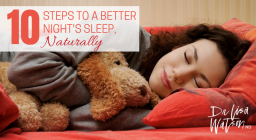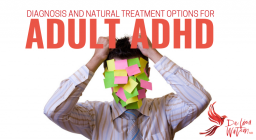
There is no question that teens need their sleep. Often parents recognize when their teens are sleeping too late – waking at noon or later, but insomnia in teens often goes unnoticed.
An article in the journal Sleep suggests that 12.5% of teens experience insomnia and that in almost half of those teens the insomnia is chronic. This means that insomnia is just as common in teens as depression, anxiety, and substance abuse. So why are teens losing sleep?
 Sleep patterns in teens
Sleep patterns in teens
Major changes in sleep patterns happen during the teen years. Sleep patterns in teens are different than those of children and adults. Teens need, on average 8.5 to 9.5 hours of sleep per night. However, the hormone that is responsible for causing feelings of sleepiness (melatonin) is produced later in teens than in children and adults. This means that teens often have difficulty falling asleep early and tend to stay up later at night. Combined with an early waking time for school it is nearly impossible for most teens to get the necessary 8.5 to 9.5 hours of sleep each night.
Mood disorders and sleep
Disturbed sleep is associated with mood disorders in teens – teens with insomnia are more likely to be depressed or anxious, and anxious or depressed teens are more likely to have insomnia. Although in adults these conditions are more common in females, in teens insomnia is equally as likely to affect boys as girls.
It is unclear whether insomnia leads to anxiety and depression or if the reverse is true. It is clear that these conditions are affecting the health of teens and that identification and treatment of insomnia in teens is an important health goal.
Recognizing sleep disorders in teens
There are many signs that can identify sleep disorders in teens. These include:
- Difficulty waking in the morning
- Falling asleep in class
- Inability to concentrate
- Decreased performance in school
- Feelings of moodiness or depression
- Late afternoon fatigue
- Cravings for sugar in the afternoon
- Decreased motivation
Sleep deprivation or insomnia?
Biologically determined circadian rhythms are keeping teens up later – but biology doesn’t take all the blame. For some teens part-time jobs, homework, social activities, computer games, television, social media sites and other behaviours are keeping teens up late – beyond the point where their bodies and minds are tired. These teens are choosing to sleep less, prioritizing other activities by sacrificing sleep.
Signs that a teen may be sleep deprived rather than suffering from insomnia include:
- Use of caffeinated beverages (cola, tea or coffee) or “energy drinks” to stay awake at night
- Late night video game or television watching
- Anger or moodiness when confronted about sleep issues
Treating teen insomnia
Establishing appropriate sleep-time rituals is the first step to encouraging healthy sleep in teens.
- Set a regular bedtime
Establish a regular bedtime and stick to it. Going to bed at the same time every night trains our body to fall asleep more easily and to sleep more soundly. Compromise on a reasonable bedtime – one that allows time in the evening for activities but also allows for adequate sleep each night.
2. Remove the television and computer from the bedroom
Any light before bedtime – including the light from a television or computer screen can disrupt the body’s ability to initiate sleep. It is best to keep the television and computer in a separate room and have the focus in the bedroom be on sleep.
Caffeine (soda, tea, coffee, chocolate) and other stimulants should be avoided from early afternoon on to avoid disrupting sleep.
4. Keep the bedroom dark at bedtime, and bright at waking
Darkness stimulates the body to produce melatonin – the hormone that causes sleepiness. Use dark window coverings to block light from the outdoors. Turn alarm clocks towards the wall or cover them up. In the morning bright light stimulates our body to wake up – place a lamp on a timer to help the body wake up more naturally.
5. Avoid napping too much
Napping can help to meet our sleep needs, but napping too much can disrupt nighttime sleep. Nap for no more than 40 minutes and nap only between 3 and 4pm – no napping after 5pm or falling asleep at night will be difficult.
In addition, some natural therapies can be effective in treating short-term insomnia in teens. For chronic insomnia a consultation with a sleep specialist is recommended.
- Melatonin
The hormone that is responsible for sleepiness can be taken as a supplement. Since melatonin production in teens is delayed (some studies suggest it isn’t being produced until 1am, compared with 10pm for adults) there is some evidence to suggest that taking a melatonin supplement can help teens with insomnia fall asleep at a reasonable time.
Melatonin should not be used in teens before puberty or in early stages of puberty. It should only be used for short periods of time and in low doses. Consult with a Naturopathic Doctor to determine if melatonin supplementation is appropriate for your teen.
2. Passionflower
 A gentle botanical (plant-based) medicine that is effective in the treatment of insomnia associated with restlessness, anxiety or over-active mind at bedtime. This type of insomnia is common in teens, with anxiety over tests, social relationships, jobs, and other issues. A cup of passionflower tea 30 minutes before bed or a passionflower supplement can be used safely for acute insomnia in teens.
A gentle botanical (plant-based) medicine that is effective in the treatment of insomnia associated with restlessness, anxiety or over-active mind at bedtime. This type of insomnia is common in teens, with anxiety over tests, social relationships, jobs, and other issues. A cup of passionflower tea 30 minutes before bed or a passionflower supplement can be used safely for acute insomnia in teens.
Passionflower should not be used during pregnancy.
3. Chamomile
Another gentle botanical that can be used as a mild sleep aid in children, adults and teens. Taken as a tea 30 minutes before bed or in supplement form it can effectively treat acute insomnia and is very calming.
Chamomile should not be used in pregnancy or in people with hayfever.
4. Valerian
One of the most common natural supplements for sleep, valerian is not recommended for use in teens. Valerian has similar properties to benzodiazepine drugs and in children and teens these medications can often cause restlessness rather than sleepiness.
Insomnia in teens is a health concern that should be taken seriously. Talking with teens about appropriate bedtime behaviours, maintaining a regular bedtime and the occasional use of supplements can help teens get the sleep they need to succeed in school, work and life.
Disclaimer
The advice provided in this article is for informational purposes only. It is meant to augment and not replace consultation with a licensed health care provider. Consultation with a Naturopathic Doctor or other primary care provider is recommended for anyone suffering from a health problem.
Resources:
Natural Medicines Comprehensive Database: Monographs on Valerian, Melatonin, Passionflower and Chamomile. Accessed November 1, 2010. http://naturaldatabase.therapeuticresearch.com/
Roberts R, Roberts CR, Chan W. Persistence and Change in Symptoms of Insomnia among Adolescents. SLEEP 2008;31(2): 177-184.


















Hello,
I live in NYC and am concerned about my teenage son’s sleep problems (he goes to sleep very late and gets run down; the issue has become a source of family stress). Can you recommend someone in NYC with whom I could get guidance and support for this issue? Thanks, Andrea Allan
You can find a qualified naturopathic physician through the New York State Association of Naturopathic Physicians. http://www.nyanp.org/
~Lisa
My 18 year old grandson has had insomnia for several months. Sometimes not being able to fall asleep until 5 am. He then has to get up at 7 and go to school. He denies stress or depression. Should he see his physician? He has tried many things to help but nothing does.
Yes. He definitely needs a sleep study done. Assessing his melatonin production is also a good idea. He’s right in the age group for a condition known as delayed onset melatonin production. If that’s the problem it may be treated. ~Dr. Lisa
[…] Teen Insomnia | Dr. Lisa Watson […]